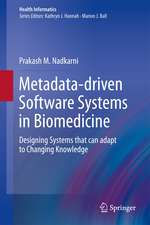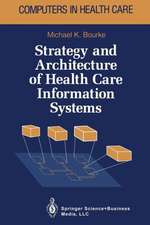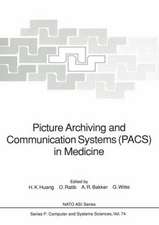Terminology and Terminological Systems: Health Informatics
Editat de Peter L. Elkinen Limba Engleză Paperback – 23 aug 2016
Din seria Health Informatics
- 5%
 Preț: 429.40 lei
Preț: 429.40 lei - 5%
 Preț: 458.30 lei
Preț: 458.30 lei - 5%
 Preț: 326.78 lei
Preț: 326.78 lei - 5%
 Preț: 418.61 lei
Preț: 418.61 lei - 5%
 Preț: 353.45 lei
Preț: 353.45 lei - 5%
 Preț: 787.58 lei
Preț: 787.58 lei - 5%
 Preț: 1038.14 lei
Preț: 1038.14 lei - 5%
 Preț: 269.08 lei
Preț: 269.08 lei - 5%
 Preț: 488.26 lei
Preț: 488.26 lei - 5%
 Preț: 570.44 lei
Preț: 570.44 lei - 5%
 Preț: 404.78 lei
Preț: 404.78 lei - 5%
 Preț: 342.03 lei
Preț: 342.03 lei - 5%
 Preț: 416.38 lei
Preț: 416.38 lei - 5%
 Preț: 384.05 lei
Preț: 384.05 lei - 5%
 Preț: 341.48 lei
Preț: 341.48 lei - 5%
 Preț: 385.01 lei
Preț: 385.01 lei - 5%
 Preț: 363.07 lei
Preț: 363.07 lei - 5%
 Preț: 735.46 lei
Preț: 735.46 lei - 5%
 Preț: 769.80 lei
Preț: 769.80 lei -
 Preț: 384.86 lei
Preț: 384.86 lei - 5%
 Preț: 727.44 lei
Preț: 727.44 lei - 5%
 Preț: 719.74 lei
Preț: 719.74 lei - 5%
 Preț: 724.14 lei
Preț: 724.14 lei - 5%
 Preț: 649.68 lei
Preț: 649.68 lei - 5%
 Preț: 723.21 lei
Preț: 723.21 lei - 5%
 Preț: 589.18 lei
Preț: 589.18 lei - 5%
 Preț: 1104.48 lei
Preț: 1104.48 lei - 5%
 Preț: 366.70 lei
Preț: 366.70 lei - 5%
 Preț: 905.70 lei
Preț: 905.70 lei - 5%
 Preț: 717.00 lei
Preț: 717.00 lei - 5%
 Preț: 1122.94 lei
Preț: 1122.94 lei - 5%
 Preț: 731.80 lei
Preț: 731.80 lei - 5%
 Preț: 776.78 lei
Preț: 776.78 lei - 5%
 Preț: 844.27 lei
Preț: 844.27 lei - 5%
 Preț: 1102.10 lei
Preț: 1102.10 lei - 5%
 Preț: 380.25 lei
Preț: 380.25 lei - 5%
 Preț: 720.84 lei
Preț: 720.84 lei - 5%
 Preț: 771.30 lei
Preț: 771.30 lei - 5%
 Preț: 717.73 lei
Preț: 717.73 lei - 5%
 Preț: 388.48 lei
Preț: 388.48 lei - 5%
 Preț: 423.84 lei
Preț: 423.84 lei - 5%
 Preț: 724.50 lei
Preț: 724.50 lei
Preț: 341.00 lei
Preț vechi: 358.94 lei
-5% Nou
Puncte Express: 512
Preț estimativ în valută:
65.26€ • 70.86$ • 54.82£
65.26€ • 70.86$ • 54.82£
Carte tipărită la comandă
Livrare economică 18-24 aprilie
Preluare comenzi: 021 569.72.76
Specificații
ISBN-13: 9781447169697
ISBN-10: 1447169697
Pagini: 221
Ilustrații: XIX, 221 p.
Dimensiuni: 178 x 254 mm
Ediția:Softcover reprint of the original 1st ed. 2012
Editura: SPRINGER LONDON
Colecția Springer
Seria Health Informatics
Locul publicării:London, United Kingdom
ISBN-10: 1447169697
Pagini: 221
Ilustrații: XIX, 221 p.
Dimensiuni: 178 x 254 mm
Ediția:Softcover reprint of the original 1st ed. 2012
Editura: SPRINGER LONDON
Colecția Springer
Seria Health Informatics
Locul publicării:London, United Kingdom
Cuprins
1. Introduction.- 2.History of Terminology.- 3. Knowledge Representation.- 4.Theoretical Foundations.- 5. Compositionality.- 6. Interface Terminologies.- 7. Terminological Standards.- 8. Implementations of Terminology.- 9. Terminological Systems.- 10. Conclusion.
Recenzii
From the reviews:
“The clear, direct prose with its balance of breadth and depth, survey and explanation make the book suitable for both novice and advanced students of healthcare informatics, and the numerous definitions and concise style make it a handy reference for healthcare professionals. … this book provides useful lists of terminology standards, implementations, and systems. … A valuable addition to Springer’s influential Health Informatics series, it will prove helpful to students and useful in libraries.” (Frank Ritchel Ames, Doody’s Review Service, September, 2012)
“The clear, direct prose with its balance of breadth and depth, survey and explanation make the book suitable for both novice and advanced students of healthcare informatics, and the numerous definitions and concise style make it a handy reference for healthcare professionals. … this book provides useful lists of terminology standards, implementations, and systems. … A valuable addition to Springer’s influential Health Informatics series, it will prove helpful to students and useful in libraries.” (Frank Ritchel Ames, Doody’s Review Service, September, 2012)
Notă biografică
Peter L. Elkin
Textul de pe ultima copertă
Twenty-five years ago the notion that terminology should be concept-based was all but unknown in healthcare; now almost all important terminologies are at least partly concept-based. With no general model of what a terminology was or should be, there were no tools to support terminology development and maintenance. Steady progress since then has improved both terminology content and the technology and processes used to sustain that content.
For students, practitioners and managers, terminology and its understanding will be an asset to be leveraged in care and research. As the first book devoted to the story of terminology in healthcare, Terminology and Terminological Systems emphasizes the central topics of terminology, such as inter-enterprise clinical and research data aggregation, and will become vital to the professional lives of students of informatics.
For students, practitioners and managers, terminology and its understanding will be an asset tobe leveraged in care and research. As the first book devoted to the story of terminology in healthcare, Terminology and Terminological Systems emphasizes the central topics of terminology, such as inter-enterprise clinical and research data aggregation, and will become vital to the professional lives of students of informatics.
For students, practitioners and managers, terminology and its understanding will be an asset to be leveraged in care and research. As the first book devoted to the story of terminology in healthcare, Terminology and Terminological Systems emphasizes the central topics of terminology, such as inter-enterprise clinical and research data aggregation, and will become vital to the professional lives of students of informatics.
For students, practitioners and managers, terminology and its understanding will be an asset tobe leveraged in care and research. As the first book devoted to the story of terminology in healthcare, Terminology and Terminological Systems emphasizes the central topics of terminology, such as inter-enterprise clinical and research data aggregation, and will become vital to the professional lives of students of informatics.
Caracteristici
The book will appeal to a wide audience Its problem-solving approach serves as both an ideal teaching tool for informatics students and as a useful guide for professionals in charge of systems implementation in health care settings The vision of this book is unique to the field of Health Informatics as it immerses readers in the basis and use of reference terminologies, including the guidelines needed to use them safely Several in-depth examples cover the field of concept-based indexing, allowing readers to experience its effectiveness in real situations without having to employ the technique






















